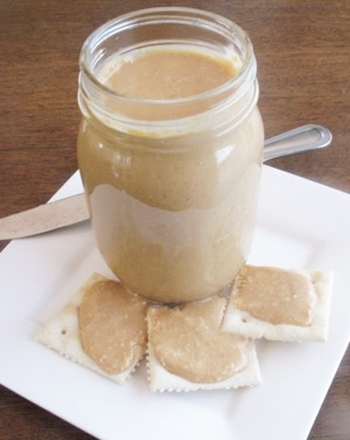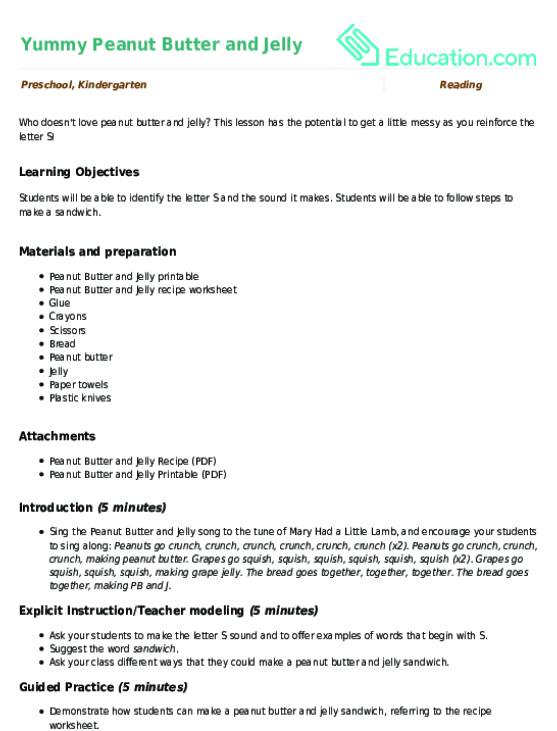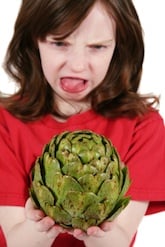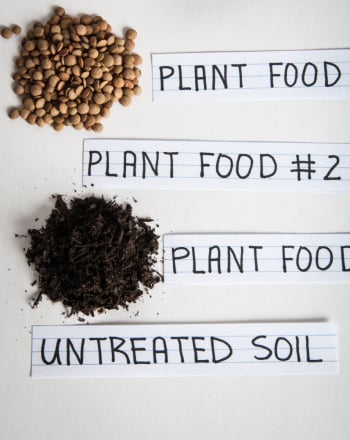Science project
Peanut Butter Anyone? Which Tastes Better, Commercial Brands or Organic Brands?
Grade Level: 5th - 6th; Type: Life Science
Objective:
To determine which peanut butter tastes better, commercial brands or organic brands?
Research Questions:
- What are organic foods?
- What is organic food production?
- Under organic production, what kinds of pesticides are allowed, what kinds are prohibited?
- Are organically grown foods better in terms of nutritional value? What is the evidence for this claim?
- Are organically grown foods more expensive?
- What is the environmental impact of organic systems of farming?
- What evidence is there that organic farming can potentially destroy rain forests?
On the information level, this experiment serves to acquaint students with basic information on organic versus commercial brands of foods. In this case, the students are conducting taste tests of specific brands of peanut butter. In the process of this investigation, students acquire basic information as to what constitutes organically grown food and what kinds of regulations we impose on organic farmers and producers, They discover what “certified organic” means in practical terms, what kinds of pesticides are allowed as well as the environmental impact of this kind of farming such as a decrease in the release of synthetic pesticides resulting in less damage to our soil, water and local terrestrial and aquatic wildlife. In sum, they may determine what tastes better but in the process also learn what may be ecologically better in the long run.
This science fair experiment also serves to acquaint students with the essential processes of sciencing such as the importance of the use of a control when required, of identifying dependent and independent variables, of selecting a large enough sample of subjects when applicable to the objective, of accurate and organized data collection, of pictorial and or graphic presentation of data and of being able to make better judgments as to the validity and reliability of their findings. They take on the role of scientists and in the process they learn to act as scientist.
Materials:
- Samples of peanut butter such as the organic brand of Nature`s Promise
- the commercial brands of Skippy and Jiff
- plastic spoons
- napkins, blind folds
- paper cups
- water
- the availability of a sink.
Experimental Procedure:
- Select your subjects. The greater the number of subjects you have, the greater will be the reliability of your findings.
- Gather all of your materials. Samples of peanut butter such as the organic brand of Nature`s Promise, the commercial brands of Skippy and Jiff, plastic spoons, napkins, blind folds, paper cups, water and the availability of a sink.
- Label your paper cups A, B and C, placing a sample of each of the peanut butters in a separate cup.
- Copy the chart provided below so that you may readily record your data.
- Provide directions to your subjects. Explain that they will be blind folded, that they will be tasting 3 samples of peanut butter and that they are to rate them on a scale of 1 representing fair,2 representing good and 3 representing great. Make certain that they are to rinse their mouths after each taste test.
- As each subject completes the taste tests, record the data in your chart.
- You may wish to take photos of the process to include in your report or to display on your charts at the Science Fair.
- Review the data and consider graphing it.
- Record your conclusion.
- Prepare your report and include all of the following: a clear statement of the problem, your hypothesis, namely what did you predict would occur, and a list of the materials used. Include any safety precautions taken. Describe the procedures used. Include all the data that were gathered. Include all charts. Formulate your conclusions. For dramatic value, you may include photos of the materials used or of you and your subjects in the process of conducting this investigation. Include a bibliography of sources you used. You may wish to assess what you did and describe what you would do differently if you were to do this project again. You may wish to expand this research next year. What other materials might you investigate for this purpose? Other organically grown or raised foods, medicines or products?
Charting The Data: Which Brand Of Peanut Butter Tastes The Best?
| Subjects | Nature`s | Nature`s | Nature`s | Skippy | Skippy | Skippy | Jiff | Jiff | Jiff |
| Number | Fair | Good | Great | Fair | Good | Great | Fair | Good | Great |
| #1 | |||||||||
| #2 | |||||||||
| #3 | |||||||||
| #4 | |||||||||
| #5 | |||||||||
| #6 | |||||||||
| #7 | |||||||||
| #8 | |||||||||
| #9 | |||||||||
| #10 |
Terms/Concepts: Organic food, pesticides, non-organic pesticides, commercial brands.
References:
- en.wikipedia.org/wiki/Organic_food -
- www.grinningplanet.com/.../health-benefits-of-organic-food-article.htm - Similar
- Roseboro,Ken The Organic Food Handbook: A Consumer`s Guide
Education.com provides the Science Fair Project Ideas for informational purposes only. Education.com does not make any guarantee or representation regarding the Science Fair Project Ideas and is not responsible or liable for any loss or damage, directly or indirectly, caused by your use of such information. By accessing the Science Fair Project Ideas, you waive and renounce any claims against Education.com that arise thereof. In addition, your access to Education.com's website and Science Fair Project Ideas is covered by Education.com's Privacy Policy and site Terms of Use, which include limitations on Education.com's liability.
Warning is hereby given that not all Project Ideas are appropriate for all individuals or in all circumstances. Implementation of any Science Project Idea should be undertaken only in appropriate settings and with appropriate parental or other supervision. Reading and following the safety precautions of all materials used in a project is the sole responsibility of each individual. For further information, consult your state's handbook of Science Safety.













